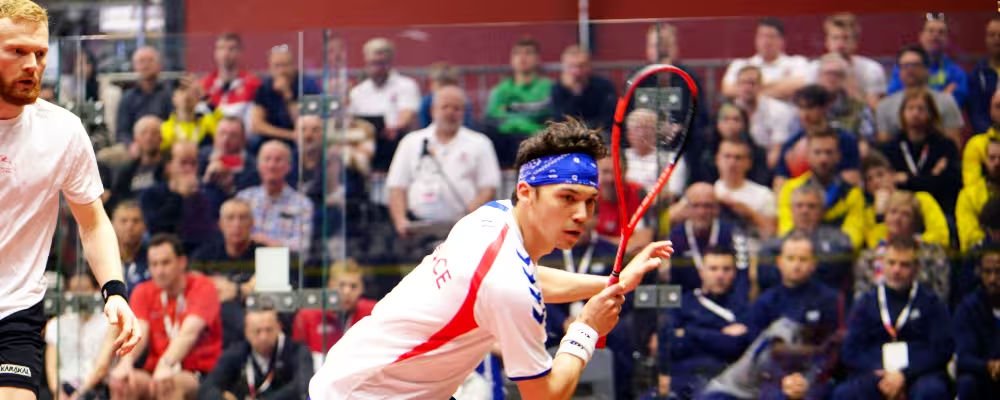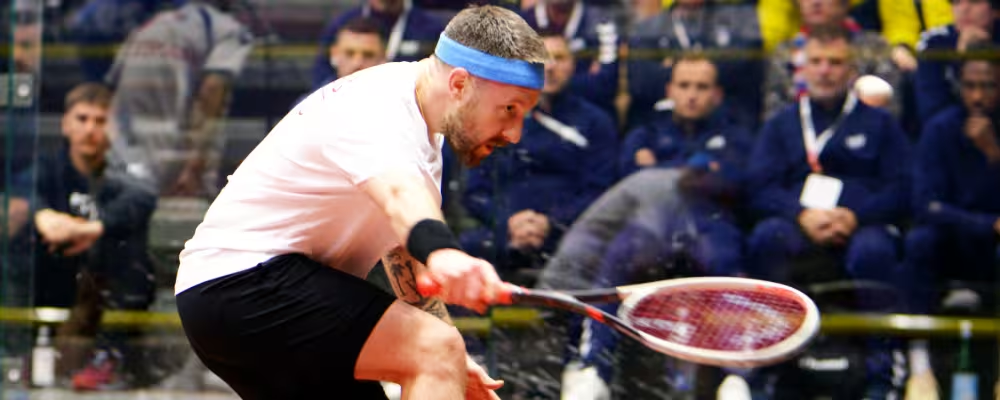29 January 2024 / 7-Min Read / Translate
Ask non-squash playing people what they think, believe or have heard about squash and you will hear some of the misconceptions listed below. Some misconceptions are more likely in different parts of the world and with different socio-economic groups, many are common to everybody.
The sport and its players have a responsibility to promote squash in the best way possible and take every opportunity to dispel these misconceptions.
Let’s run through some misconceptions and see how we can best change people’s minds. The misconceptions are not in any particular order.
Learning to play squash with the wrong ball and a very heavy racket is certainly not the best way to learn. The challenge for squash is that some people do learn with exactly those things. In addition, they might try it for the very first time with another complete beginner, and clearly that’s not a good idea.
All the factors that make squash so addictive for most players; the different types of squash balls, the size of the ball (smaller than most sports), the small size of the racket head, the back wall and side walls, and the speed at which the ball can move, not to mention the almost chess-like strategy, can also be the elements that some new players find difficult.
When a new player is introduced to squash with the right ball and a modern racket under the guidance of a patient partner (qualified coach or not), hitting the ball is generally not that difficult for most people.
Back in June 2022, I wrote an article entitled Introduce One New Person To Squash This Year and I’d like to take this opportunity to say it again. Imagine if every squash player introduced one new person to squash each and every year! How quickly would the player base grow?
How To Dispel:
Besides actively trying to introduce new players, if you ever see new players using the wrong ball or doing something dangerous or inappropriate, don’t be afraid to offer some guidance.

Actually, in some places and at some times in the past, this was true, but times change. I’ve visited plenty of clubs with an all-white dress code and monthly fees in the hundreds of pounds. I’ve also visited clubs that look like something from the Victorian era and very reasonable prices.
I feel New York, USA is a great example of both ends of the scale. You have very elite clubs mixed with “Street Programmes”, both servicing a completely different market. This particular misconception can be very difficult to dispel, because for some cities and countries it still has a ring of truth. But let’s be clear, there is a very real difference between expensive and elitist. Just because some clubs are up-market doesn’t mean the sport itself is elitist.
How To Dispel:
Inform people that there are no barriers to entering the sport, except location of courts. Yes, some cities may only have expensive country-clubs, but that’s just a reflection of the populace rather than a reflection of the sport itself.
On the one hand, you can find plenty of articles saying that squash is one of the healthiest sports you can participate in, and on the other hand, you hear people claiming it’s bad for your body, especially your back and joints.
I sit here writing this article with two replaced hips, and plenty of issues with my back and shoulders, and yet, I know that squash hasn’t caused those issues. Almost any activity performed to extremes over many many years is probably not great for you.
For the average player, who plays 3 times per week, squash is fantastic for your mind and body. So does that mean that 4 times or more is bad? No, but it does mean that if you take squash that seriously, you should be doing training that strengthens and flexes your back core and legs to avoid injury and also improve your performance.
Back in the day, professional athletes used to spend 90% of their time doing their sport, with the other 10% running, stretching and maybe some weight training. Playing and ghosting was on hard floors with very basic shoes. It’s not surprising that people my age have some many physical issues.
One final point I would like to make is that squash can be incredibly addictive for some, and you can suddenly find yourself playing upwards of 5 times per week. ANY physically demanding sport will probably not be great for your long-term health.
How To Dispel:
Remind people that sports science has come a long way, even in the last 20 years, and we are much more aware of the long-term effects of different physical activity. With a sensible approach and a care-based training programme, you can easily be playing squash into your 70s.
The close proximity of two players within a confined space, can certainly lead to a misunderstanding of squash. Big swings and unaware players have the potential to cause injury, but so can falling off your bike on a busy road or slipping on your way to the swimming pool.
If you walk onto the squash court with the concept of giving your opponent space and keeping your swing compact and controlled, then squash is not dangerous.
Yes, I advocate for everybody, from beginners to pros to wear goggles, but that’s just in case an accident happens: the same for wearing a helmet on a bike or knee & elbow pads when rollerblading. Squash is not dangerous, but two new players who haven’t taken the time to learn a little about the sport, could hurt each other.
I feel that I keep having to make comparisons with other sports, and that’s not right, but it is the reality. Many injuries I hear about are just bad luck, not something that is inherently because of squash.
How To Dispel:
Heat up properly to avoid injuries, learn how to keep your swing compact, understand that you are sharing a small space with another person, and finally wear goggles every single time you play and it’s very likely you will never consider squash even slightly dangerous.

Back in the 1980s and 1990s, the image of squash was for twenty-something men, who wanted to win at all costs and squash with its high physical demand and the ability to hit the ball hard, fit the criteria for a sport that appealed to those people.
That wasn’t true then and is not true now. Squash players can be competitive. Can be. But so can tiddlywinks players. Is it the sport that defines the type of players or the type of players that define the sport?
Most squash matches around the world are very friendly events. Squash players are one of the friendliest groups I have ever encountered. I feel confident that I could visit ANY squash club in the world and say I am in town for a few days and looking for a game, and nearly all would welcome me. Sure, there would be quite a few country-clubs that would turn me away, but if the squash players of that club had their way, I would probably be playing with them.
Squash is for all kinds of people, from happy-go-lucky to the other extreme of wanting to win every single point. In general, most squash players are somewhere in the middle of those extremes.
How To Dispel:
Invite them to play and be friendly and kind. Any sport is what the players make it, and while there are some aggressive squash players, it’s worth remembering, they are aggressive in their daily lives too. Nobody turns from an angel into a demon when they walk onto a squash court.
Squash is an easy-to-learn, friendly, average-priced, great-for-the-mind-and-body, safe sport for all ages, income levels and competitive spirit.
Don’t believe everything you might hear about it. Get on court with somebody who already plays and you will likely be hooked for life.
There are other myths and I will be writing part 2 of this article sometime in the near future, but if you want to send me the myths you have heard, please do so. I am curious to know of any local ones.